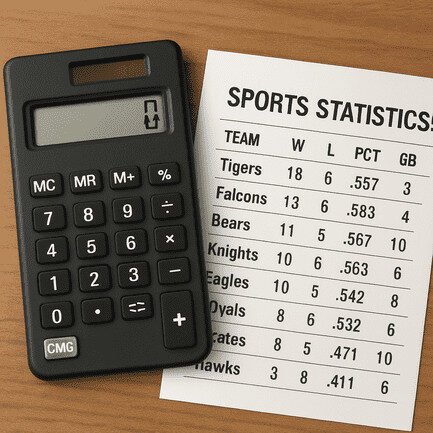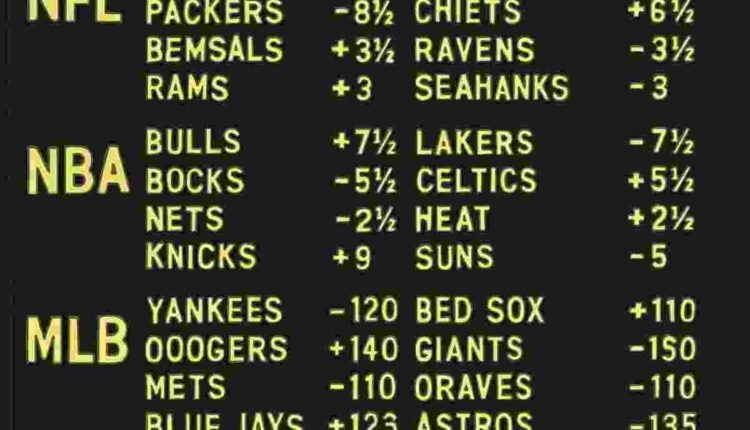Sports odds represent the probability of a specific outcome occurring in a sporting event. They help bettors understand the potential return on their wagers. Odds can be presented in various formats, including decimal, fractional, and moneyline. Each format conveys the same information but in different ways. Read the Best info about banker of the day 1×2.
The Core Concept of Sports Odds
At the heart of sports betting lies the concept of probability. Sports odds serve as a bridge between an event’s likelihood and the potential returns. By understanding this relationship, bettors can make informed decisions. The essence of sports odds is to quantify how likely an event is to happen and how much you stand to gain if it does.
Different Formats of Odds
Various regions prefer different odds formats, each with its unique presentation style. While decimal odds are straightforward and popular in Europe, fractional odds have a historical foothold in the UK. Moneyline odds, however, dominate the American landscape. Familiarizing yourself with these formats is crucial for global betting success.
The Importance of Odds in Betting Strategy
Odds are more than just numbers; they’re strategic tools. They guide bettors in assessing risk and reward, forming the backbone of any betting strategy. Understanding odds can help you determine value bets, manage your bankroll effectively, and ultimately enhance your overall betting approach.
Decimal Odds
Decimal odds are popular in Europe, Australia, and Canada. They are straightforward and easy to understand. The decimal number represents the total payout rather than just the profit. For example, if the odds are 2.50, a $10 bet would return $25 (including your initial stake).
Simplicity and Calculation
The simplicity of decimal odds makes them a favorite among beginners. Calculating potential returns is as easy as multiplying your stake by the odds. This straightforward approach eliminates confusion, allowing bettors to quickly assess potential profits.
Understanding the Total Payout
With decimal odds, the focus is on the total payout, which includes your initial stake. This holistic view helps bettors understand the full scope of their potential returns. By grasping this concept, you can better evaluate the attractiveness of different betting opportunities.
Application Across Various Sports
Decimal odds are not limited to a particular sport. They are versatile and can be applied across a wide range of sports, from soccer to tennis. This adaptability makes them a valuable tool for bettors looking to diversify their portfolios.
Fractional Odds
Fractional odds are commonly used in the UK and Ireland. They are expressed as fractions, such as 5/1 or 2/5. The first number indicates the potential profit, while the second number is the amount you need to stake. So, a 5/1 odd means you win $5 for every $1 wagered.
Origins and Popularity
Fractional odds have a rich history rooted in horse racing. Their longstanding use in the UK and Ireland has cemented their popularity. Understanding their origins can provide context and enhance your appreciation of this odds format.
Calculating Profit and Stake
The fractional format focuses on the relationship between profit and stake. By understanding this ratio, bettors can easily calculate potential profits. This clarity allows for more precise risk management and strategic betting decisions.
Comparing Fractional Odds with Other Formats
While fractional odds may seem complex compared to decimal or moneyline odds, they offer unique insights. Comparing these formats can help you appreciate their nuances and choose the best fit for your betting style.
Moneyline Odds
Moneyline odds, prevalent in the United States, can be a bit more complicated. They are presented as positive or negative numbers. Positive numbers show how much profit you’d make on a $100 bet, while negative numbers indicate how much you need to bet to win $100. For example, +200 means you win $200 on a $100 bet, whereas -150 means you need to bet $150 to win $100.
Positive and Negative Moneylines
Moneyline odds are unique in their presentation, with both positive and negative numbers. Positive moneylines indicate underdogs, while negative moneylines represent favorites. Understanding this distinction is crucial for effective betting.
The Influence of American Sports Culture
The prevalence of moneyline odds in the United States is closely tied to American sports culture. This format is particularly popular in sports like football and basketball. Exploring its cultural significance can provide deeper insights into its widespread use.
Converting Moneyline to Other Formats
Converting moneyline odds to decimal or fractional formats can be beneficial for international bettors. This skill allows you to compare odds across different platforms and make more informed betting decisions.
How to Calculate Sports Odds

Understanding how to calculate sports odds is pivotal for making informed bets. Let’s break it down into simple steps:
Step 1: Determine the Implied Probability
Implied probability converts odds into a percentage representing the likelihood of an outcome. For decimal odds, the formula is ( \frac{1}{\text{Decimal Odds}} \times 100 ). This conversion is fundamental for assessing the true value of a bet, enabling you to see beyond the surface numbers.
Step 2: Compare with Your Prediction
Assess the implied probability against your own analysis or predictions. If you believe an outcome is more likely than the odds suggest, it might be a value bet. This comparison forms the cornerstone of strategic betting, allowing you to identify opportunities where the odds are in your favor.
Step 3: Consider the Payout
Calculate potential winnings based on your stake and the odds offered. This helps you decide if the risk-reward ratio aligns with your betting strategy. By considering the payout, you can ensure that your bets are not only informed but also financially sound.
Factors Influencing Sports Odds
Numerous factors can influence sports odds, including team performance, player injuries, weather conditions, and historical data. Here’s how these factors can impact betting outcomes:
Team Performance Analysis
A team’s current form is a crucial determinant of odds. Bookmakers analyze recent performances, head-to-head records, and statistical data to set the odds. Teams on a winning streak might have shorter odds, indicating lower potential payouts. Delving deeper into performance metrics can provide you with insights that bookmakers use to set their odds.
The Impact of Player Injuries
Injuries to key players can significantly alter the odds. Bookmakers adjust the odds based on the impact of an injured player on the team’s chances of winning. Staying updated on team news can give you an edge when predicting outcomes. Understanding the depth and composition of a team can help you gauge the true impact of injuries.
Weather Conditions and Their Influence
Weather can influence the outcome of outdoor sports like football, cricket, or tennis. Rain or wind can affect gameplay, leading to unexpected results. Bookmakers factor weather forecasts into their odds calculations, which can present opportunities for astute bettors. Analyzing past performances under similar conditions can offer predictive insights.
Historical Data and Patterns
Historical performance data helps bookmakers assess potential outcomes. Teams with a strong track record against specific opponents often have more favorable odds. Analyzing historical data can provide insights into potential value bets. Recognizing patterns in historical matchups can help you anticipate future outcomes more accurately.
Sports Betting Tips for Beginners
Embarking on your sports betting journey can be exciting, but it’s essential to approach it with a strategic mindset. Here are some valuable tips for beginners:
Start Small and Build Confidence
Begin with small wagers to gain experience without risking significant amounts of money. This approach allows you to learn and develop your betting skills gradually. By starting small, you can build confidence and refine your strategies without undue pressure.
Comprehensive Research and Analysis
Before placing a bet, conduct thorough research on the teams or players involved. Consider factors like form, injuries, and historical performance. The more informed you are, the better your chances of making successful bets. Research should be an ongoing process, adapting to new information and trends.
Effective Bankroll Management
Effective bankroll management is vital for long-term success in sports betting. Set a budget for your betting activities and stick to it. Avoid chasing losses and bet only what you can afford to lose. This discipline ensures that you can enjoy betting as a sustainable hobby rather than a financial burden.
The Dangers of Emotional Betting
Emotional betting can lead to impulsive decisions and losses. Stay objective and avoid placing bets based on personal biases or team loyalties. Rely on data and analysis to guide your betting choices. By maintaining objectivity, you can make rational decisions that align with your strategic goals.
The Role of Sports Analytics
Sports analytics plays a significant role in shaping sports odds and betting strategies. By leveraging advanced data analysis, bettors can gain insights into player performance, team dynamics, and game outcomes.
Harnessing Data-Driven Predictions
Sports analytics enables data-driven predictions, offering bettors a scientific approach to betting. Analyzing player statistics, game conditions, and other metrics can provide valuable insights for making informed bets. Embracing analytics can elevate your betting strategy from guesswork to precision.
Identifying Trends and Patterns
Analytics helps identify trends and patterns that may not be apparent through traditional analysis. Recognizing these trends can offer a competitive advantage, allowing bettors to anticipate market movements and make timely bets. By staying ahead of the curve, you can capitalize on opportunities before they become widely recognized.
The Future of Sports Betting and Analytics
The integration of analytics into sports betting is a growing trend. As technology advances, the potential for deeper insights and more accurate predictions increases. Keeping abreast of these developments can position you as a forward-thinking bettor, ready to adapt to the evolving landscape.
Conclusion
Understanding sports odds is fundamental to successful sports betting. By familiarizing yourself with different odds formats, calculating implied probabilities, and considering various influencing factors, you can enhance your betting strategy. Remember to approach betting with discipline, conduct thorough research, and leverage sports analytics for data-driven insights. With these tools and tips at your disposal, you’re well-equipped to navigate the exciting world of sports betting.


